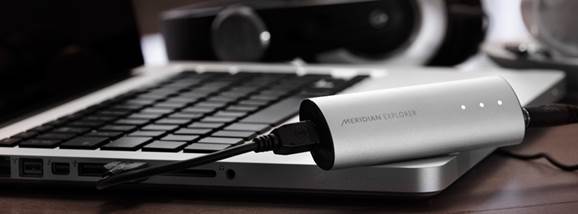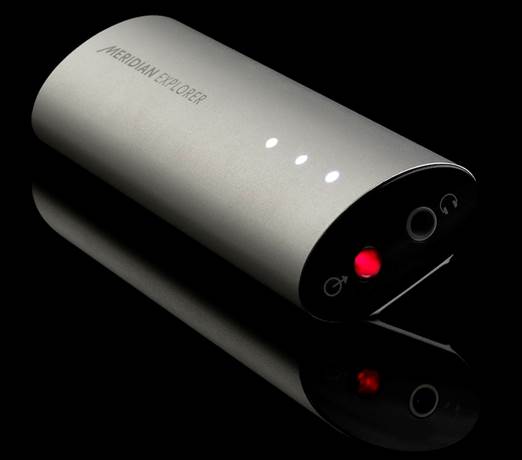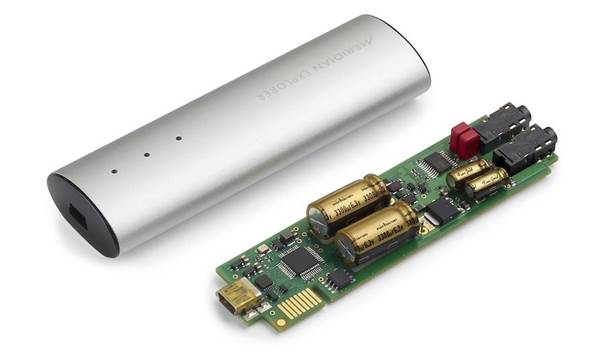The meridian explorer is an external DAC aimed at delivering
superior Sonics from a laptop or a desktop computer. It works by using
asynchronous USB clocks, which are of a higher quality than those built into
most computers, resulting in less jitter. Its other vital attribute is that it
can handle native hi-res audio files up to 24-bit/192kHz, which are becoming
increasingly popular. Since most computer soundcards have to down-sample 192kHz
to 96kHz or 48kHz, this makes the Explorer a natural fit for delivering maximum
audio enjoyment from hi-res files.

Explorer external
USB DAC
The Explorer consists of a 10cm-long cylinder, weighing just
50g and finished in high-quality brushed aluminum. It attaches to your
computer’s USB 2.0 socket, from where it draws its power. Using this cord makes
for a more elegant solution than other portable DACs that plug dongle-like into
a USB socket. Using USB 2.0 also means the Explorer can be plugged into a hub
and still handle audio up to 192 kHz sampling.
Connect more
One end of the Explorer sports two audio outputs, a
headphone jack and dual-purpose 3.5mm analogue and S/PDIF digital optical
output for fixed-level connection to a separate amp. When listening via the
headphone output the volume is controlled from the computer. The Explorer’s
approach to volume is critical in that it alters the analogue output rather
than the digital signal when changing volume to maximize the bandwidth of the
available digital resolution.

The Explorer
consists of a 10cm-long cylinder, weighing just 50g and finished in
high-quality brushed aluminum
The Toslink digital output is limited to 96kHz (with higher
res 192kHz/176.4kHz files down-sampled to 96kHz and 88.2kHz respectively), as
the bulk of the Explorer’s processing takes place in the analogue domain thanks
to a six-layer circuit board that decouples the analogue audio stages using
audiophile music-grade electrolytic capacitors. At the digital stage dual
high-quality oscillators, based on those found in Meridian’s top-of-the-line
Reference Series components, are used to extend its sampling reach to 192 kHz.
There are two USB clocks, one handles 44.1 kHz, 88.2 kHz and
176.4 kHz sampling rates, the other deals with 48 kHz, 96 kHz and 192 kHz.
Three small white LEDs down its spine light up according to the sampling rate
of the active timing clock. The incoming sampling rate can be selected using
the computer’s onscreen audio utility panel.
Setting up a Mac is a case of plugging in and choosing the
Explorer from the Sound Output pane in System Preferences. Windows users have
to download and install the drivers.

There are two USB
clocks, one handles 44.1 kHz, 88.2 kHz and 176.4 kHz sampling rates, the other
deals with 48 kHz, 96 kHz and 192 kHz
Using an iMac with a set of Philips Fidelio L1 headphones
and starting with a 24/192 download of Claire Martin and Richard Rodney
Bennett’s version of I’m Gonne Laugh You Right out of My Life, the Explorer
shows just how good computer-based audio can be. The gentle tinkling of the
ivories by Mr. Bennett sound effortlessly soft and Martin’s husky vocals take a
vice-like grip on your attention, as she delivers “affair” as a suffocated
scream and softens the “r” to a Jonathan Ross style “w” in “dreams”. With the
Explorer you feel that nothing is compromised as you are treated to a
spine-tingling emotional roller coaster with all the presence and vitality of a
live show. More heavily textured 24/192 material such as Beethoven’s Piano
Concerto No.5 in E flat majors equally compelling. The piano glides along,
teasing out the strings and wind instruments, building to fully orchestrated peaks.
The maximum bandwidth and absence of compression brings out the best of each
element of the piece. It’s a joyful listen, that never becomes tiring or a
strain, despite the great energy and changes of pace.
Special delivery
An Apple Lossless Audio Codec download of Emily Barker
singing Nostalgia in hi-res 24/96 is gritty and raw, yet delicately delivered
as the low accordion introduction blends with the gently picked guitar notes.
Barker’s soulful vocals transport you to a bleak and sodden tramline in Melbourne.
With 16-bit/44.1 material the Explorer is tight, balanced
and polished. It can’t perform miracles, an MP3 of Motorcycle Emptiness (Manic
Street Preachers) still feels clipped and lacks detail, although Thom Yorker’s
haunting vocals are certainly optimized in an AAC rip of Radiohead’s Fake
Plastic Trees. You’ll be hard pressed to find anything offering the same levels
of performance for the money.
Details
·
Price: $402.2
·
Website: meridian-audio.com
·
Our verdict: 5/5
Specification
|
Inputs
·
USB mini type B
Outputs
·
3.5mm combination analogue/digital jack with mini
Toslink digital optical <96 kHz output and 2-ch analogue line out, fixed
2v RMS.
·
3.5mm jack with variable-level headphone output,
130mW into 16Ω.
Construction
·
Extruded Aluminium shell with moulded plastic
endcaps and rubber foot.
Power
·
USB, nominal 5V at <500mA.
Indicators
·
Three white LEDs show connected state and audio
stream rate.
Implementation
·
USB audio class compliant 2.0 HS 480Mb/s
bandwidth.
·
Asynchronous: device is the clock source for high
quality.
·
Firmware upgrade via USB.
·
Windows drivers provided, no drivers required for
Macintosh OS X or Linux.
·
Analogue volume control for headphone output,
controlled from PC, control law modified to match connected OS.
·
S/PDIF output downsamples 4x (192/176.4kHz) to 2x
(96/88.2kHz).
OS Requirements
·
Macintosh OS X 10.6.4 (Snow Leopard) or later
·
Windows XP SP3, Windows 7 SP1 or Windows 8
·
Linux kernel 2.6.37 or later and ALSA version
1.0.23 or greater
|